November 24, 2014
Springfield Bishop Joseph F. Maguire, beloved bishop emeritus, dies at 95
REGIONAL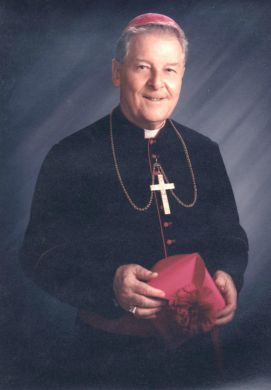
Staff report
(Iobserve file photos)
SPRINGFIELD — Bishop Joseph Francis Maguire, retired fifth bishop of Springfield, passed away peacefully this evening, Nov 23, at 6 p.m. in his residence in Springfield, surrounded by family and caregivers.
Bishop Maguire had turned 95 in September and was in the 70th year of his priesthood and 42nd year as a bishop. At the time of his passing, he was the fourth oldest bishop in the United States.
Despite having officially retired more than two decades ago, he had continued to be one of the most popular and beloved public figures in western Massachusetts.
Diocesan officials said Bishop Maguire’s health had been in decline in recent years. In 2008 he was diagnosed with vascular Parkinson’s Disease, a muscular ailment that mostly affected his legs and limited his ability to walk. Despite his impaired mobility, he continued to attend major diocesan events. His last major public appearance was June 1, 2013 when he took part in ordination ceremonies at St. Michael’s Cathedral, a day which also was Bishop Timothy A. McDonnell’s 50th anniversary of ordination.
For much of the last year, he had been confined to his residence on Elliot Street, no longer making public appearances. However, despite being homebound, until very recently he continued to receive visitors, as well as speak with friends and family daily. Bishop Rozanski, as did Bishop McDonnell before him, paid a daily visit to Bishop Maguire, bringing him Communion and conversing about the affairs of the diocese.
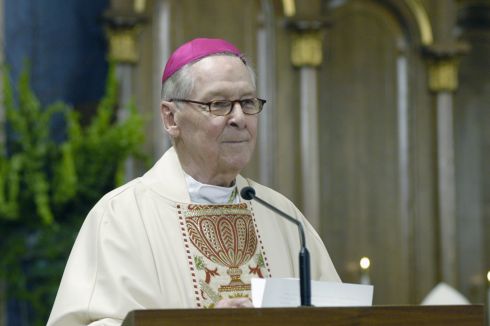
“I only had the opportunity to know Bishop Maguire for a very few months,” Bishop Rozanski told iobserve. “But even in that short time, I came to realize what a special and very gifted person he was, a true blessing to the church — I feel honored to have known him.”
Born in the Mission Hill section of Roxbury in Boston on Sept. 4, 1919, he was the beloved son of the late Joseph T. Maguire and Grace (Wenger) Maguire both of Boston. He was raised in Boston and graduated from St. Columbkille Elementary and High schools in Brighton, Mass.
He went on to attend Boston College where he was a varsity baseball and hockey player. In a January 1939 article in the Boston College campus newspaper, The Heights, he was referred to as a “clever defenseman.” He went on with others to lead the team to a 13-1 record and the Eastern Championship. In 1984, he was inducted into the Boston College Varsity Club Athletic Hall of Fame.
In a 1995 interview with The Catholic Observer, the former newspaper of the Diocese of Springfield, Bishop Maguire described his childhood as rather typical, saying he and his family were not overly devout. He said he admired priests and was influenced by the sisters at his school, but he did not remember ever being particularly set on becoming a priest.
“When I was at Boston College, I think it was my third year, one of our Jesuit professors mentioned it (the priesthood) to me and my reaction was not too positive,” he said with a smile during his interview. “Every time I saw him after that, I’d cross over to the other side of the street.”
Following his 1941 graduation from Boston College, when the United States instituted the military draft, the future bishop enlisted in the Marine Corps, but he was not immediately called to active duty. He then applied to, and was accepted at, St. John Seminary in Brighton, where he studied until his ordination four years later.
Along with 33 classmates, on June 29, 1945, he was ordained by the late Cardinal Richard Cushing, archbishop of Boston.
In a September 2009 Catholic Communications interview, he said of his vocation, “I just thought that would be the best way for me to save my soul and others along the way.” That would prove providential.
His priestly assignments in eastern Massachusetts included St. Joseph Parish in Lynn, St. Ann Parish in Readville and Blessed Sacrament Parish in Jamaica Plains, where he served from 1948 to 1960. From 1956 until 1959, then-Father Joseph Maguire served in the Massachusetts Army National Guard with the rank of captain and Catholic chaplain. His next assignment brought him to St. Mary of the Hills Parish in Milton.
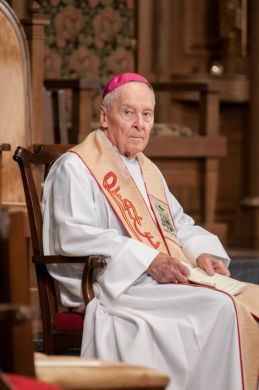
In 1962, he received an assignment which would set him on the pathway to his future role as bishop when he was asked to serve as master of ceremonies for the legendary Cardinal Cushing. His gentle and pleasant demeanor quickly impressed the cardinal and priests of the archdiocese. He would serve Cardinal Cushing as his health deteriorated. During that time, the cardinal honored him with the title of monsignor.
After the cardinal passed away, Msgr. Maguire served for a brief time as secretary to Boston Cardinal Humberto Medeiros before returning to parish ministry as pastor of St. John the Baptist Church in Quincy, Mass. On Feb. 2, 1972, he was named an auxiliary bishop of Boston, overseeing the Brockton region of the archdiocese.
Four years later, in 1976, Pope Paul VI named him coadjutor bishop of Springfield, to work in transition with Bishop Christopher J. Weldon, whose chronic heart issues had begun to take their toll on the diocese’s fourth bishop. Just a year and a half later, on Oct. 14, 1977, he was formally installed as the fifth bishop of the Diocese of Springfield, in a ceremony held in the Springfield Civic Center to accommodate a large crowd.
From the time of his arrival in 1976, Bishop Maguire quickly became the “people’s bishop” and was known for his priestly ministry, which extended to attending numerous parish and diocesan events. He had the ability to not only remember names of people, but also recall personal and family details. He also was a regular visitor at area hospitals at all hours of the day and attended many wakes.
As bishop, he recognized the importance of reaching out to young people and always welcomed with great gladness the opportunity to be with them. He had a fatherly way with young people, and was known to take a long time in processions, slowly making his way down church aisles as he would stop to greet the children and those in attendance.
Bishop Maguire couldn’t resist throwing a baseball or football, or swinging a bat with young people when the opportunity arose. He often returned to his boyhood neighborhood, where he was fondly referred to as “Uncle Joe” and would challenge the local children to a ballgame. He played in a charity baseball game in Holyoke in the early 1980s.
In addition to his endearing, warm personality and outreach, his administration as bishop of Springfield was marked by an expansion and addition of diocesan ministries to include the Pastoral Ministry and Youth Ministry offices, as well as other programs designed to increase the involvement of the laity. Early in his tenure, he commissioned 300 lay members to be visitors of the sick and homebound, brought the RENEW program to the diocese, and welcomed the resettlement of refugees from Poland, Southeast Asia, Cuba, Haiti and Ethiopia.
He revamped the former Catholic Charities Drive into the Catholic Stewardship Appeal and, working with the Passionist Fathers and Brothers, expanded the Catholic Communications ministry, forming the first diocesan communications office.
Bishop Maguire also instituted the permanent diaconate program in the diocese. Under his tenure, the Apostolate for Black Catholics also was formed and plans to better serve the Hispanic Catholic population were unveiled. He also formed the first cabinet to help him in his administrative duties.
Bishop Maguire also was recognized for his leadership in the broader community. He served as longtime chaplain to the Western Massachusetts Chiefs of Police, a role he accepted in homage to his own father who was a Boston police detective sergeant.
He also was actively involved in ecumenical and interfaith activities. In 1986 he was awarded the National Conference of Christians and Jews Human Relations Award. Then Springfield mayor, Theodore Dimauro, said Bishop Maguire was “one of the most respected and beloved clergymen that we have had come to Springfield.”
The Massachusetts Knights of Columbus honored him with the Lantern Award in 1978 and the Holyoke’s St. Patrick Parade Committee honored him with their prestigious John F. Kennedy Award in 1983.
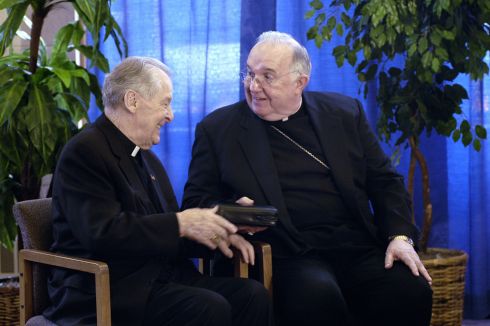
Bishop Maguire also served on the Communications Committee of the United States Catholic Conference of Bishops as well as on the committee overseeing the sainthood cause of the late Bishop Fulton Sheen
Bishop Maguire worried that changes in society were disrupting the foundation of the faith community. He was ahead of his time in worrying that the spiritual understanding of Advent was lost amid the Christmas holiday frenzy. In 1985 he authored “Enduring Love; An Advent Reflection,” focusing on the need to better prepare for Christmas.
He also was the only bishop of Springfield to be granted auxiliary bishops. In August 1980, a trusted diocesan priest and associate of Bishop Maguire, Father Leo O’Neil, was appointed by Pope John Paul II and ordained as the diocese’s first auxiliary bishop. Over the next nine years both bishops would work closely together, forging a close friendship.
Bishop O’Neil was named bishop of Manchester, N.H. in 1989 but remained close to Bishop Maguire. In December 1997, when Bishop O’Neil succumbed to cancer, Bishop Maguire was called upon to offer the homily and pay tribute to his dear friend and fellow bishop. It would be one of many poignant farewells Bishop Maguire would offer in the remaining 17 years of his life.
During his final years as bishop of Springfield, he began to recognize the looming challenges facing the diocese due to aging priests and smaller parish communities. During this time, the process of yoking parishes under a single pastor began. He also recognized the need to provide a retirement home for priests and began a campaign to create the St. Michael’s Priests Residence out of one wing of the Cathedral High School convent.
In one of his last major undertakings he raised millions of dollars through the Legacy of Faith – Legacy of Love Campaign, from which funds were used to renovate the former Cathedral High School main building on Elliot Street, allowing for a consolidation all the various diocesan central agencies, ministries and services. Prior to this, many of these had been spread out in various locations, some in commercial rental property, making it hard for collaboration among diocesan officials.
Like all bishops, he was confronted with the clergy abuse crisis and decisions he had made in good faith over the years.
Diocesan spokesperson Mark Dupont, who had worked for Bishop Maguire since 1981, said, “If Bishop Maguire had any weakness, if one could even call it that, it was his incredible trust in people to always do the right thing and be honest.”
“And while that served him well almost all of the time, it was also the reason for the few crosses he came to bear,” Dupont said.
Those crosses would include priests who betrayed Bishop Maguire’s trust, and that of the entire community, and abused young people. In some instances, these priests had been returned to ministry only after Bishop Maguire had received assurances from psychologists and counselors the men would not reoffend.
In a statement in 2012, on the occasion of the settlement of one such civil lawsuit, Bishop Maguire wrote: “I only wish that in 1976 as a new bishop, I could have foreseen the true nature of one who violated our trust with such devastating harm to his victims. I pray for these victims and their families, for their forgiveness and understanding.”
“We have learned much in the intervening years,” Bishop Maguire wrote. “Our Catholic Church has made great efforts in addressing these issues promptly and with determination that we should never repeat our past failures.”
In the early 1990s, having been informed of some heart problems, Bishop Maguire wrote to the Vatican asking to retire. His request was granted on Dec. 27, 1991, when the Vatican announced that Bishop John A. Marshall of Burlington, Vt., was to be made the sixth bishop of Springfield the following February.
In an interview prior to his retirement, Bishop Maguire told The Catholic Observer what he enjoyed most about being bishop.
“I guess the answer would be the people things – where the people are. That’s always been a great uplift for me. I often think it’s really not work, I shouldn’t get paid for it,” he said with a smile.
Turning down offers to move back to the Archdiocese of Boston in retirement, he instead settled for a modest apartment above the chancery on Elliot Street, where he lived out his remaining years.
Retirement in 1992 started out with a setback, as within just a few months he was hospitalized on Cape Cod with a heart attack. Later that year, his nephew, Paul Waystack, passed away. But Bishop Maguire was quick to rebound and start in earnest his second career as bishop emeritus.
Freed of the office and administrative duties, he focused on doing what he enjoyed most, being with people. With his faithful driver, Joseph Boudreau, at the wheel, Bishop Maguire attended numerous functions and made new friends as the goodwill ambassador for the diocese. He also found time to root for his favorite New England sports teams as well as maintaining a special fondness for his beloved Boston College Eagles.
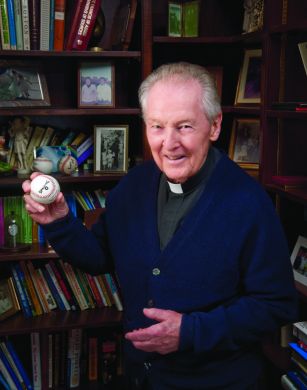
Retirement also meant some extra time with his family, whom he loved dearly. Though his parents had long passed away, his sister, Grace, was his greatest friend and confidant. At her home on Cape Cod, he was “Uncle Joe,” enjoying his nephews and nieces, grandnephews and grandnieces. His closeness to his sister increased after her husband, his brother-in-law, Philip Waystack, died in 1998. He spoke to his sister almost daily and, while his health permitted, spent extended vacations with her.
Her death in 2012 was a tremendous blow to bishop. In what was his final public homily, he spoke at both her funeral on Cape Cod and at a memorial Mass a week later at St. Michael’s Cathedral, noting the gift she was to him and the entire family. Diocesan staff and friends said that her passing affected him deeply, as he quietly retreated to his apartment on Elliot Street.
Bishop Maguire leaves his devoted nephews and nieces, Philip R. Waystack Jr., and his wife, Beverly, of Colebrook, N.H.; Mary W. Banks and her husband, Harold, of West Falmouth, Mass.; Richard J. Waystack and his wife, Bernadette, of Harwich Port, Mass.; and Joseph F. Waystack of Plymouth, Mass. He also leaves his six cherished grandnieces and grandnephews, Sarah C. Banks; Harold V. Banks; Christopher R. Waystack; Kateri G. Seeley and her husband, Nicholas; Emily J. Waystack; and Benjamin J. Waystack; and his cherished great-great grandniece, Juliete Grace Seeley. He also leaves his closest contemporary among the clergy of the Springfield Diocese, Father Francis X. Sullivan, with whom he had grown close over the years.
The Rite of Reception will be held on Sunday, Nov. 30, 2014 beginning at 1:30 p.m. at The Cathedral of Saint Michael the Archangel, 254 State Street, Springfield. Following the Rite of Reception, Bishop Maguire will Lie in State at the Cathedral from 1:30 p.m. until 7 p.m. followed by a Prayer Vigil Service at 7 p.m. A Pontifical Liturgy of Christian Burial will be held on Monday morning, Dec. 1, 2014 at 11 a.m. at the Cathedral. The Rite of Committal and Entombment will follow the Mass at Saint Michael the Archangel Mausoleum, 1601 State Street, Springfield. Bishop Maguire’s funeral arrangements have been entrusted to the St. Pierre – Phaneuf Springfield Chapels, (413-737-1177), 7 Chapin Terrace, Springfield, MA 01107. His family has requested that in lieu of flowers, memorial donations may be made in Bishop Maguire’s memory to the Bishop Joseph F. Maguire Scholarship Fund. c/o Diocese of Springfield, PO Box 1730, Springfield, MA 01102-1730.
In his final published interview in 2009, which appeared in the pilot edition of The Catholic Mirror, Bishop Maguire said that looking back at his life, “I was lucky enough to be able to adapt and to roll with punches and not to get too hung up or too confused or too upset about what was transpiring in the world because change is part of our existence.”
For the Diocese of Springfield, Dupont said, “That change now means adjusting to life without one of its most gracious and gifted leaders.”


 Facebook
Facebook Youtube
Youtube
